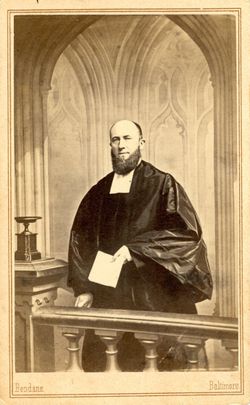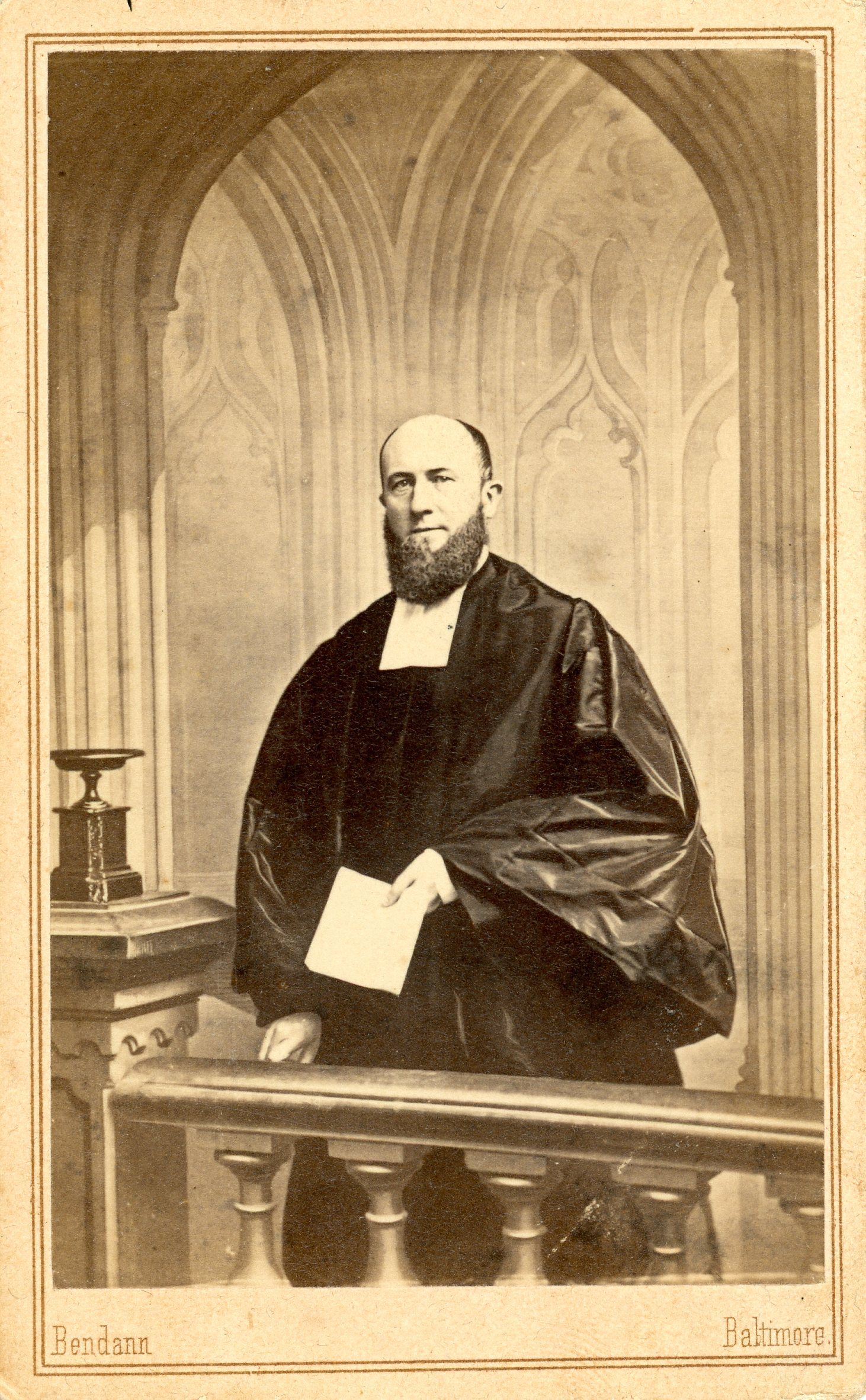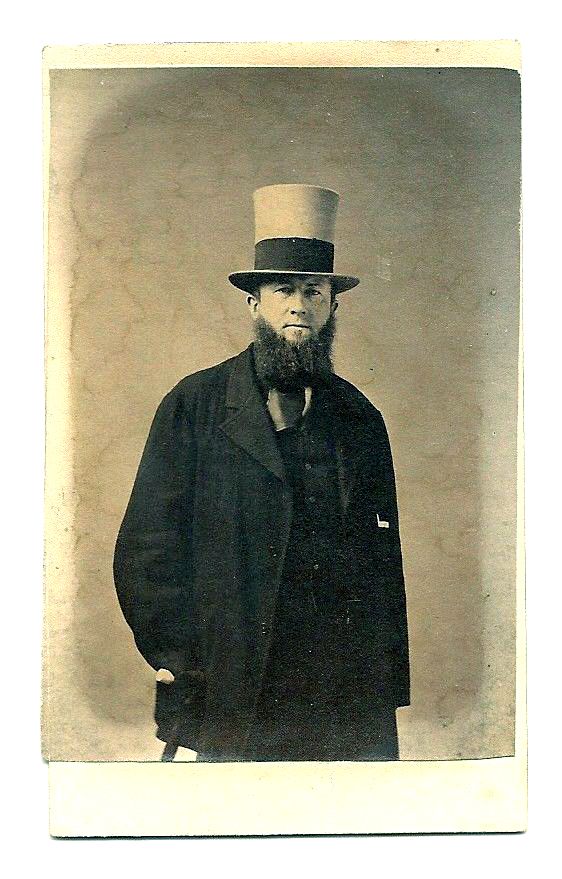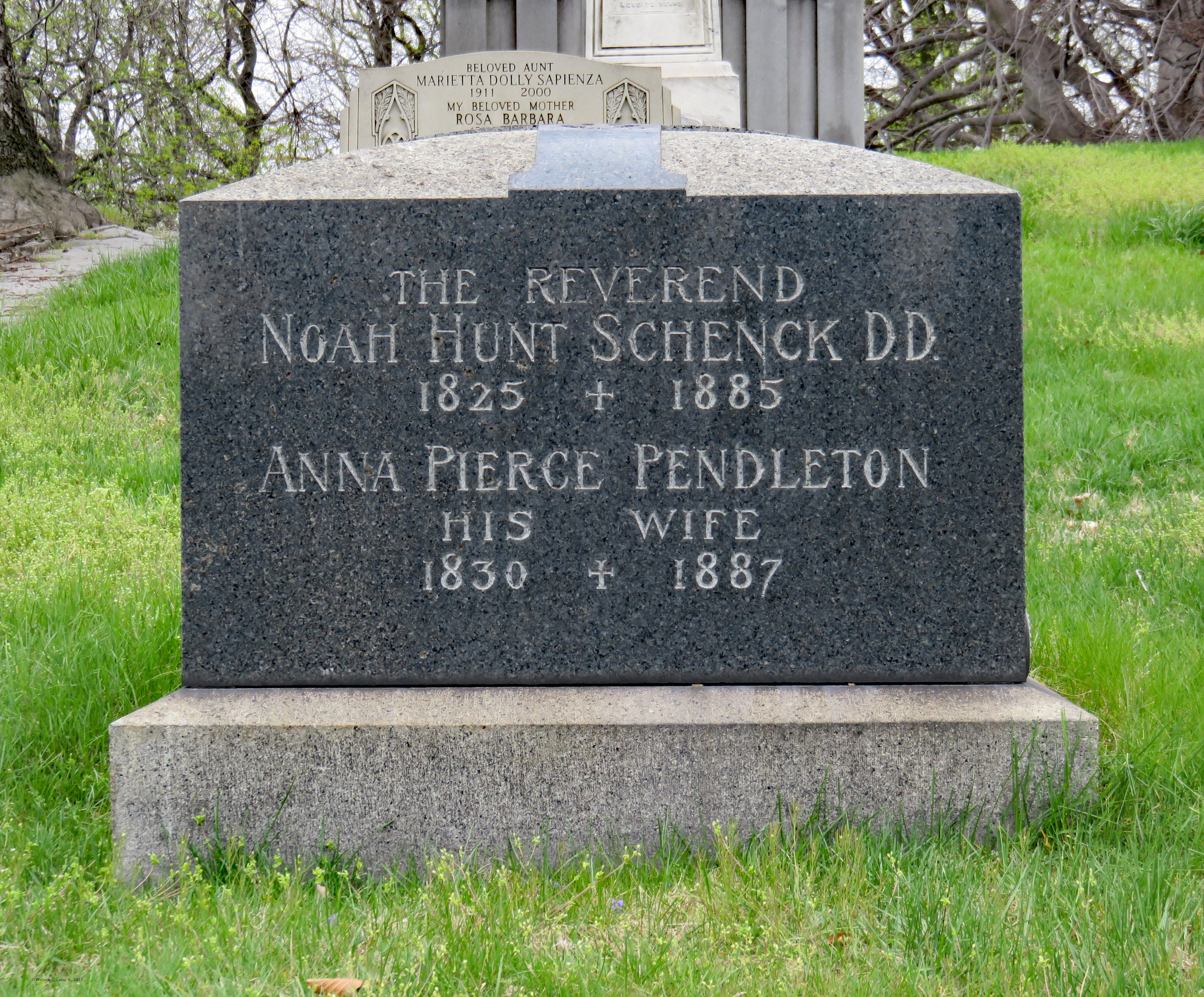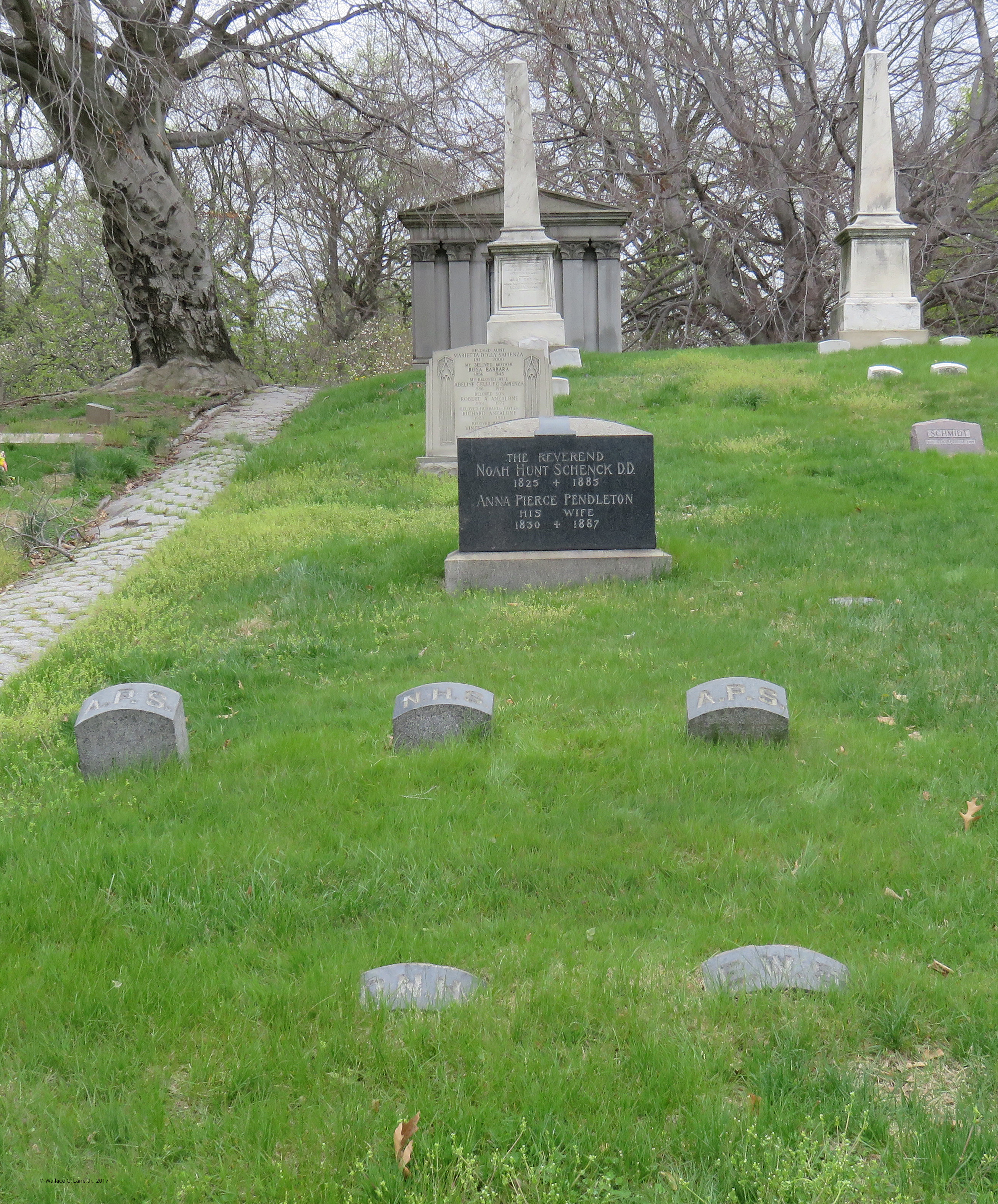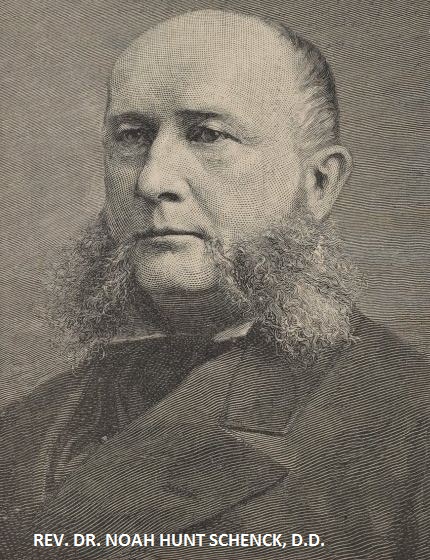Frank Leslie's Sunday Magazine, New York; Vol. 17, Jan -
June, 1885.
THE REV. DR. NOAH H. SCHENCK.
The Rev. Dr. Noah Hunt Schenck, rector of St. Ann's
Episcopal Church, the oldest and most fashionable church
of that denomination in Brooklyn, died at his residence in
that city on Sunday, January 4th. Dr. Schenck had been
failing since Spring from a general breaking down, caused
by hard mental work. Two weeks before his death he was
compelled to take to bed on account of a lame foot, he
having bad a corn removed, which developed into gan-
grene of the toe. When a young man he cut the tendons
of the left foot, and always had trouble with the circula-
tion of the blood in that foot. He leaves a widow, six sons
and four daughters, most of whom were at his bedside
when he passed painlessly away. Funeral services were
held at the church of which he was rector for eighteen
years, on January 7th, Bishop Littlejohn officiating, and
the body was interred in Greenwood.
Dr. Schenck was in his sixtieth year, having been born in
Pennington, N. J, in 1825. He was graduated from
Princeton in 1814, and then devoted himself to the study of
law, whioh he practiced first in Trenton, N. J., and afterward
in Cincinnati, until 1851.
At the age of twenty-six he abandoned his law practice
and began studying for the ministry in the theological
seminary at Gambier, Ohio, from which he was graduated in
1853. He was ordained a clergyman on September 4th of
that year at Philadelphia, and his first charges were Ross
Chapel, at Gambier, and St. Mary's Church, Hillsborough,
Ohio. He spent a little over two years in these parishes,
and then took pastoral charge of old Trinity Church, in
Chicago, where he remained two years. During his stay
there he was also editor of the Western Churchman. He
was a very eloquent preacher, and popular with his
congregation. In 1857 he was invited to the rectorship of
Emmanuel Church in Baltimore. He accepted the charge,
and remained in that parish for eight years and a half, at
the end of which time he took a vacation of eighteen
months, which he spent in Europe with his family. While
there he wrote numerous letters, which were published in
book-form. It was abont this time that he received his
degree of D. D. from his Alma Mater. On his return, in
1867, he became rector of St Ann's Church, Brooklyn.
During the first year of his pastorate he was the owner
and editor of the Protestan' Churchman, but he dissolved
his connection with the paper in the year 1868, because -
although a Low Churchman - he could not accept the
radical measures of the extreme faction of that school.
He succeeded in lifting a debt of $150,000 from his church.
Of this sum, E. Fulton Cutting, a son-in-law of Dr. Schenok,
contributed $70,000, on condition that the other $80,000
should be raised, and that when the debt was paid the
church should be made free. In accordance with this
condition, in November, 1878, St. Ann's was made a free
church. St. Ann's, under his direction, was raised from a
comparatively poor and struggling pariah to one of the
most prosperous in Long Island, and the congregation
increased so that at times the church was unable to hold
it. Dr. Schenck's preaching was clear and forcible, and
he was one of the most popular and attractive of Brooklyn
clergymen. He was chairman of the Committee for
Domestic Missions of the Board of Missions, and after his
establishment in Brooklyn, was always sent as a delegate
to the general conventions of the Church. In July, 1871,
he went to St. Petersburg with the Rev. Mr. Washburn
and Cyrus W. Field as delegates from the Evangelical
Alliance of America to present a memorial to the Czar of
Russia in behalf of religious liberty in the Empire. The
delegates were received by Prince Gortschakoff, who
accepted the memorial in the name of his imperial master,
while he declined, at the same time, to receive a memorial
from the Evangelical Alliance of England on the ground
that it contained expressions insulting to the Czar.
In social life, Dr. Schenck was prominent. He was a
member of the Hamilton Club, of Brooklyn; of the Century,
University and St. Nicholas Clubs, of New York city, and of
the St. Nicholas Society, of which he was one of the
chaplains.
____________________________________________________
Frank Leslie's Sunday Magazine, New York; Vol. 17, Jan -
June, 1885.
THE REV. DR. NOAH H. SCHENCK.
The Rev. Dr. Noah Hunt Schenck, rector of St. Ann's
Episcopal Church, the oldest and most fashionable church
of that denomination in Brooklyn, died at his residence in
that city on Sunday, January 4th. Dr. Schenck had been
failing since Spring from a general breaking down, caused
by hard mental work. Two weeks before his death he was
compelled to take to bed on account of a lame foot, he
having bad a corn removed, which developed into gan-
grene of the toe. When a young man he cut the tendons
of the left foot, and always had trouble with the circula-
tion of the blood in that foot. He leaves a widow, six sons
and four daughters, most of whom were at his bedside
when he passed painlessly away. Funeral services were
held at the church of which he was rector for eighteen
years, on January 7th, Bishop Littlejohn officiating, and
the body was interred in Greenwood.
Dr. Schenck was in his sixtieth year, having been born in
Pennington, N. J, in 1825. He was graduated from
Princeton in 1814, and then devoted himself to the study of
law, whioh he practiced first in Trenton, N. J., and afterward
in Cincinnati, until 1851.
At the age of twenty-six he abandoned his law practice
and began studying for the ministry in the theological
seminary at Gambier, Ohio, from which he was graduated in
1853. He was ordained a clergyman on September 4th of
that year at Philadelphia, and his first charges were Ross
Chapel, at Gambier, and St. Mary's Church, Hillsborough,
Ohio. He spent a little over two years in these parishes,
and then took pastoral charge of old Trinity Church, in
Chicago, where he remained two years. During his stay
there he was also editor of the Western Churchman. He
was a very eloquent preacher, and popular with his
congregation. In 1857 he was invited to the rectorship of
Emmanuel Church in Baltimore. He accepted the charge,
and remained in that parish for eight years and a half, at
the end of which time he took a vacation of eighteen
months, which he spent in Europe with his family. While
there he wrote numerous letters, which were published in
book-form. It was abont this time that he received his
degree of D. D. from his Alma Mater. On his return, in
1867, he became rector of St Ann's Church, Brooklyn.
During the first year of his pastorate he was the owner
and editor of the Protestan' Churchman, but he dissolved
his connection with the paper in the year 1868, because -
although a Low Churchman - he could not accept the
radical measures of the extreme faction of that school.
He succeeded in lifting a debt of $150,000 from his church.
Of this sum, E. Fulton Cutting, a son-in-law of Dr. Schenok,
contributed $70,000, on condition that the other $80,000
should be raised, and that when the debt was paid the
church should be made free. In accordance with this
condition, in November, 1878, St. Ann's was made a free
church. St. Ann's, under his direction, was raised from a
comparatively poor and struggling pariah to one of the
most prosperous in Long Island, and the congregation
increased so that at times the church was unable to hold
it. Dr. Schenck's preaching was clear and forcible, and
he was one of the most popular and attractive of Brooklyn
clergymen. He was chairman of the Committee for
Domestic Missions of the Board of Missions, and after his
establishment in Brooklyn, was always sent as a delegate
to the general conventions of the Church. In July, 1871,
he went to St. Petersburg with the Rev. Mr. Washburn
and Cyrus W. Field as delegates from the Evangelical
Alliance of America to present a memorial to the Czar of
Russia in behalf of religious liberty in the Empire. The
delegates were received by Prince Gortschakoff, who
accepted the memorial in the name of his imperial master,
while he declined, at the same time, to receive a memorial
from the Evangelical Alliance of England on the ground
that it contained expressions insulting to the Czar.
In social life, Dr. Schenck was prominent. He was a
member of the Hamilton Club, of Brooklyn; of the Century,
University and St. Nicholas Clubs, of New York city, and of
the St. Nicholas Society, of which he was one of the
chaplains.
____________________________________________________
Family Members
Advertisement
Explore more
Sponsored by Ancestry
Advertisement
